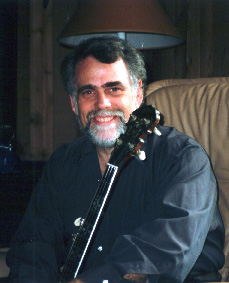Rick Shubb

Rick Shubb was born in Oakland, California. He took up the 5-string banjo at the age of fourteen, inspired by the playing of Earl Scruggs. In those days bluegrass music was a rarity on the West Coast, and Rick became one of a handful of pioneers who planted its seeds and nurtured a music scene. for several years he balanced a music career with an art career, and his dance posters and comic book art are still in demand by collectors.
Rick was a charter member of San Francisco's most venerable bluegrass band, High Country, and while still in his teens, became the regular banjoist for the powerful bluegrass vocal duo, Vern and Ray. His work is prominently featured on their album "Sounds of the Ozarks."
While in his early twenties, he teamed up with mandolinist David Grisman to form a band. Some of their mandolin-banjo duets were harbingers of the style of acoustic string music which Grisman went on to develop and popularize.
In his mid twenties he formed a musical partnership with guitarist Bob Wilson: an association which still exists today. It was with Wilson that Rick Shubb found a framework in which to further explore the potential of the 5-string banjo. Ignoring stylistic stereotypes, Shubb and Wilson delved into jazz, ragtime, country, standards, and swing, blending these influences with the bluegrass usually expected from the banjo.
Throughout his twenties Rick continued to play the San Francisco music scene. Fronting his own band, the Hired Hands, he held forth three or four nights a week at such SF institutions as Paul's Saloon and Mooney's Pub. During this time he also strongly influenced West Coast music as a teacher. The 5-string banjo was at the height of its popularity, and Rick's students numbered in the hundreds. Many have gone on to become professional musicians themselves, while the playing styles and musical sensibilities of legions more were molded for all time by Rick's teaching.
Eventually a particularly compelling project would lead him away from the path of performing. For several years he had tinkered with improvements to musical instruments. He had collaborated with his friend Dave Coontz to bring two innovative banjo accessories onto the market, but keeping up with the demand for these could easily be done in his spare time. However, in 1980 he and Dave came up with a guitar accessory which would take the world by storm. The device was a capo; a clamp that goes onto a guitar neck to raise the pitch. The new Shubb Capo quickly became so popular that meeting the demand soon turned into a full time job, and Rick's playing career was placed on the back burner.
You might say that the rest is history. The Shubb Capo remains the industry standard, and the job of supplying them has given birth to a flourishing company which Rick Shubb runs on a daily, hands-on basis. He and his company continue to develop new products for musicians, including a line of computer software which Rick has developed himself.
While the name Shubb has become a household word to guitarists throughout the world, most identify it with a device rather than a person, and are surprised when they discover that its namesake and inventor is himself a world-class musician.
In the early '90s a hand injury prevented Rick from playing music at all for more than two years. For an instrumentalist, this is an eternity. Content with his successful business and other creative projects, he had made the difficult decision to not pick the banjo back up again. But friends in the musical community were not content with his decision, and urged him to get his instrument back out of its case. Touched by their encouragement, he began the uphill climb to regain his chops.
Today Rick Shubb's banjo playing is not only back, but it's better than ever. A CD of his music — Bodega Sessions — has recently been released, featuring long-time partner Bob Wilson on guitar and bassist Charlie Warren, and showcasing the uniquely personal banjo style which has been a West Coast legend for many years.
|
Bodega Sessions: $15.95 about the tracks | about
Rick Shubb | about Bob Wilson | about
Charlie Warren home | Products | Music CDs | Store | Artists | Company | Rick's Cafe
|